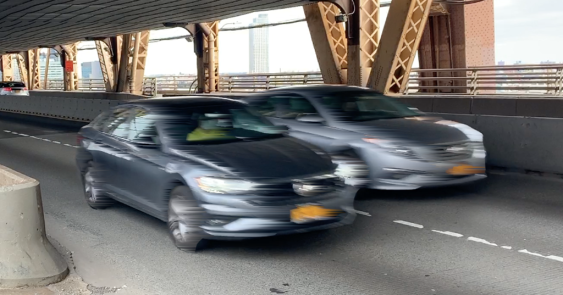
It's the New Math: a dollar-a-trip rise in the cost of fuel for a car trip to Manhattan is cutting traffic almost as much as Mayor Bloomberg's eight-dollar toll plan would have done.
Too good to be true, right? But that's the slant of the front-page headline in today's Times, "Politics Failed, but Fuel Prices Cut Congestion":
Soaring gas prices and higher tolls seem to be doing for traffic in New York what Mayor Michael R. Bloomberg's ambitious congestion pricing was supposed to do: reducing the number of cars clogging the city’s streets and pushing more people to use mass transit.
The article reports that traffic on MTA bridges and tunnels within the city and the Port Authority's Hudson River crossings was down this spring by 4-5 percent compared with a year ago -- within hailing distance of the 6.3 percent drop sought by the mayor's plan.
Good news, but how much of the decline is due to the price of gas and how much to the toll increases that took effect around the same time?
I think that so far the tolls have been the bigger factor. Here's why: a typical round-trip into the Manhattan CBD uses between 1.3 and 1.4
gallons of gas (based on an average 22.6-mile round-trip distance and a stop-and-start
17 miles per gallon). Nationally, gas cost $3.65 this April-May and $3.05 a year earlier, for a year-to-year increase of 60 cents a gallon or just 80 cents per trip. The toll increase was a good deal higher than this, even accounting for trips into town via the free bridges.
Okay, hardly anyone does these calculations before deciding whether or not to drive. And perhaps $4 gas will start to act as a tipping point, making it socially acceptable to drive less and triggering larger defections from cars than the numbers would predict -- particularly in transit-rich environments like the New York region.
Could happen. But I wouldn't count on it. In recent years, the "elasticity" of gasoline consumption, as indicated by changes in usage relative to changes in pump prices, has been fairly constant across a wide range of price fluctuations. (See spreadsheet.) We'll know more on this score in a few months, when usage data corresponding to the $4 price become available.
The Times quotes traffic guru Sam Schwartz:
If we start eclipsing $5 a gallon, which we might over the summer, I think we might get very close [to the mayor's goal].
Gridlock Sam may be right. But what the article doesn't say is, first, whether that 6.3 percent drop in Manhattan traffic (and 1-2 percent citywide) is so momentous; and, second, which tool for cutting traffic is more desirable: a "market-driven" gasoline price rise that enriches the owners of petroleum, or a socially-decided road-pricing policy whose revenues would be available to improve transit.
Relying on punishingly high gas prices to undo a century of motorist-skewed traffic policies is like praying for a hailstorm to cure a drought. Congestion pricing, particularly via game-changing programs such as the Kheel Plan, remains essential for New York.
Photo: dM.nyc™/Flickr





